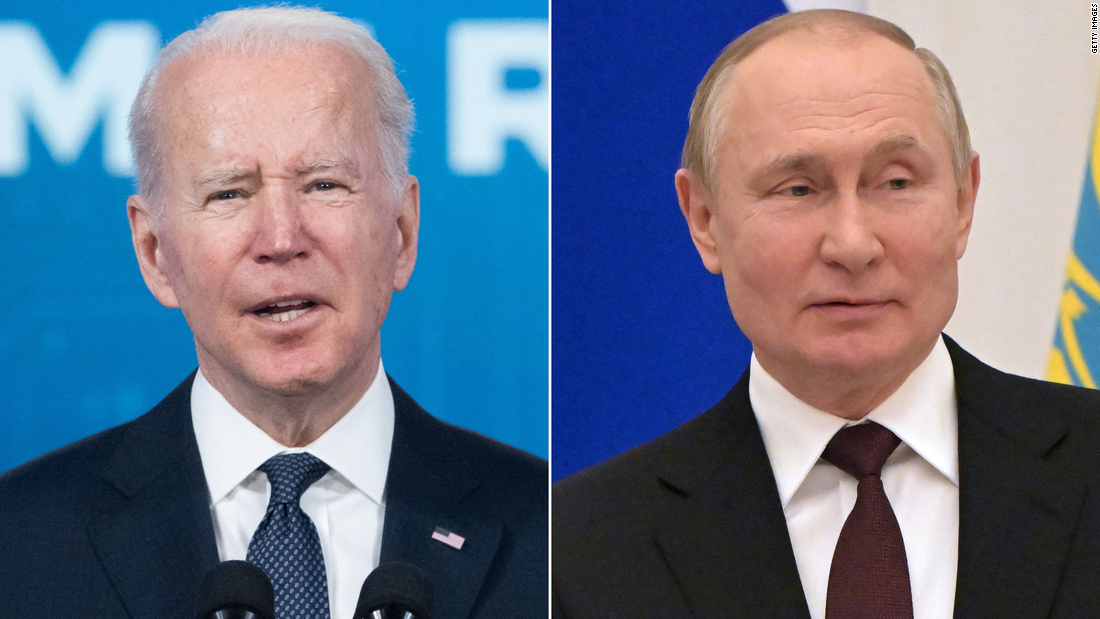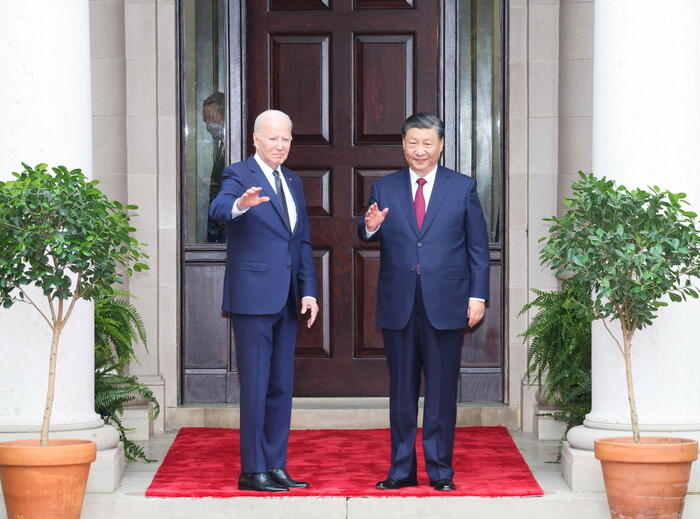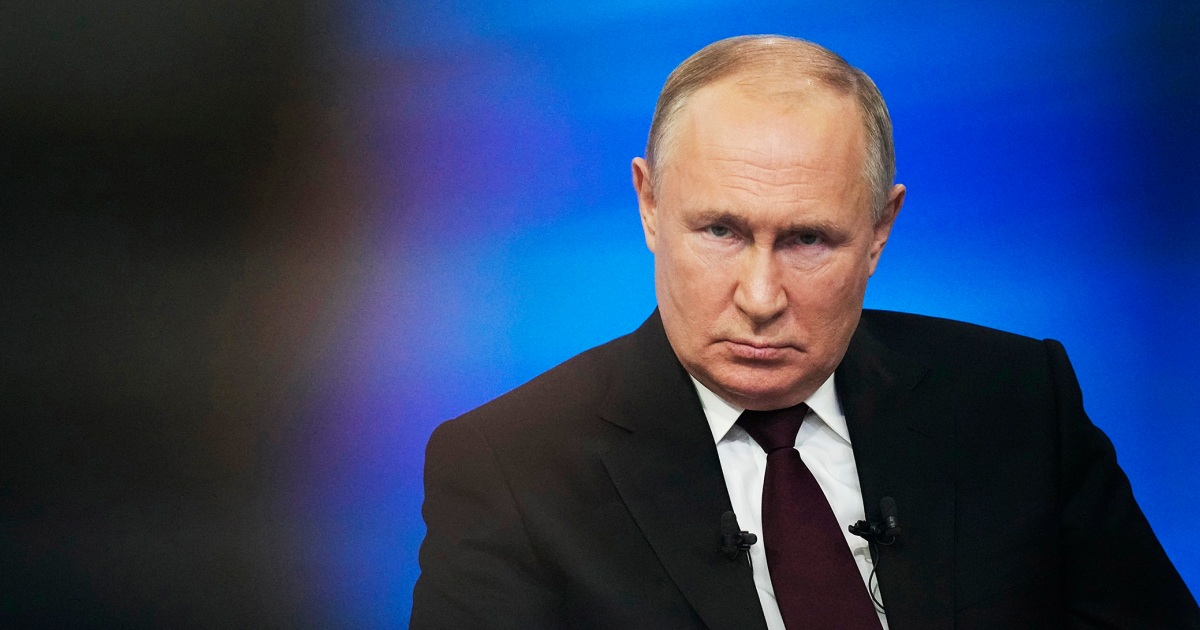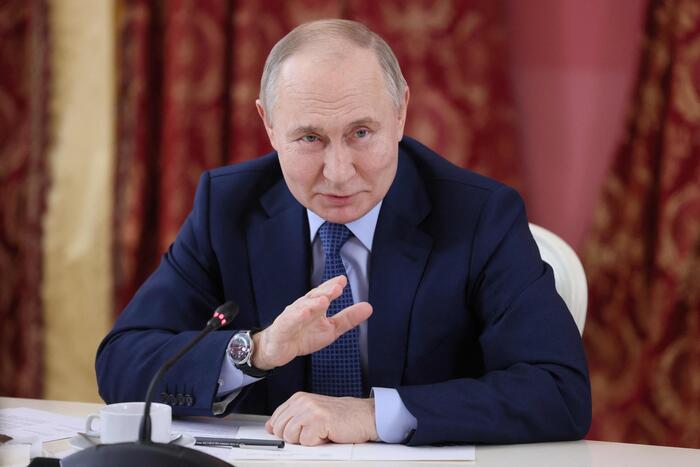Russia conducts military exercises and NATO reaffirms its commitment to allied countries 2:43
(CNN) —
For months, the Biden administration has fueled alarming headlines and stunned Washington with a rare series of previously classified official intelligence revelations exposing some of the Russian moves as Moscow masses troops on the Ukrainian border.
Administration officials told CNN that the revelations have been carefully coordinated between the National Security Council, the intelligence community and other national security agencies in an effort to disrupt Russian planning, mitigate the effectiveness of any " false flag" and ultimately deter military action.
News from the Ukraine-Russia crisis: Blinken warns that the Russian invasion of Ukraine 'could start at any moment'
In fact, there are signs that the strategy is working, US officials say.
The Biden administration believes Russian President Vladimir Putin was caught off guard by some of the revelations, according to a senior US official.
Additionally, intelligence intercepts have identified Russian military and intelligence officials who complain about their plans being exposed, CNN previously reported.
"The hope is that the Russians will be surprised by the allied knowledge of these things and have an internal reaction," a senior Western intelligence official told CNN.
"Usually what you would expect to see is the Russians wondering if they have a mole."
"That's helpful in making them doubt themselves. It's helpful in making them wonder if they can actually execute some of these plans and still have secrets and surprises," this person continued.
"Sometimes if you cast enough doubt on the system, they might actually remove some competent people who they suspect are spies who, in fact, are not spies at all."
advertising
On video, Russia's military tests in Belarus 0:37
The United States has previously downgraded and released classified information in the service of other foreign policy objectives.
Sometimes effectively and sometimes, as in the run-up to the Iraq war, disastrously.
However, the sheer volume of current revelations makes Biden's approach to this evolving crisis stand out.
Clashes with the media
However, the strategy has also led to clashes with the US media over the government's unwillingness to show evidence of its claims.
The revelations have come largely as statements by agency spokespeople.
Additionally, officials have provided little evidence.
In fact, they have asked journalists to report on the material without confirmation.
(Other news accounts of the crisis, of course, come from conventional reporting and unauthorized leaks.)
"If you doubt the credibility of the United States government, the British government, other governments and you want to, you know, find solace in the information that the Russians are revealing, that's up to you," the State Department spokesman replied, Ned Price, when he was challenged last week.
Later, he called the reporter in question to apologize.
What the US sees could indicate Russia is launching an invasion of Ukraine
Last week, spokesmen for several agencies said the United States had intelligence showing that Russia planned to release a staged video showing attacks staged by Ukrainian forces to create a pretext for military action.
In January, the US said it had credible information indicating that Russia had previously located a group of agents to run a separate false flag operation in eastern Ukraine.
And in December, the White House released a declassified document that said Russia was planning an offensive in early 2022 with up to 175,000 troops.
Officials have also been remarkably specific in public about the number of Russian soldiers they have seen amassed on the Ukrainian border.
“We are not instrumentalizing the press.
What we are doing is a strategic communications campaign,” the Western intelligence official said.
"Keep in mind that there are many potential audiences for these disclosures. Whether they are made from the podium or made in a background briefing or in other formats. I would judge that the State Department was also probably trying to tell the people. that 'this is the nature of this crisis. This is what we see.'"
Also, the tactic has some high-profile precedents from the Cold War.
In 1962, the administration of President John F. Kennedy published photos of Soviet ballistic missiles located in Cuba, amid the escalating crisis there.
And he did it, in part, to convince a skeptical press corps in the US and UK.
Possibilities of Russian assault on Kyiv are high, says former ambassador 4:11
In 2022, the goal is more operational: It is an effort to deny Russia the same element of surprise that it took advantage of in 2014, when it annexed Crimea.
Many of the same American officials in government now had front-row seats in decision-making in 2014. And, in that sense, they are "absolutely" responding to the lessons learned from that experience, Western diplomats told CNN.
In 2014, Western officials were shocked by Russia's denials that it was sending unidentified troops to the peninsula before the actual assault, according to a Western diplomat.
Officials told reporters in the background that they were skeptical about the "little green men" on the ground.
But, they did not declare it publicly to counter Russia's denials.
The United States has long struggled to respond to Russia's use of so-called "grey zone" warfare tactics.
Among them, strategies such as disinformation and false flag operations, which the US Army has historically been unprepared to execute or counter.
Intelligence officials have debated for decades how and when to make early intelligence disclosures to disrupt such asymmetric tactics.
Those discussions have only intensified as Putin's Russia capitalizes on the digital age to wage sophisticated information warfare, current and former officials say.
White House Approves Plan for Troops to Support Ukraine Evacuation if Russia Invades
But the Biden administration's strategy of constant disclosure offers one of the first sustained examples of a relatively new and untested doctrine.
"The new doctrine is the potential to use intelligence as an information operations weapon," said former Director of National Intelligence James Clapper.
The former official also pointed out that the Obama administration made similar revelations after the Russian invasion of Ukraine in 2014.
Case by case
The revelations have also drawn attention because much of the information could not have been obtained from satellite images alone, which are often duplicated on public channels.
Indicating clear US access to Russian military and intelligence channels.
Satellite images provide comparatively limited information, current and former intelligence officials note.
It is impossible to deduce Putin's intention from simple tank formations, which can be used as decoys.
US officials know that Russian military doctrine explicitly accepts deception.
Precisely, a concept known in Russian as "maskirovka" or "masking".
Will Russia withdraw its troops from Belarus?
1:17
But intelligence revelations about alleged false flag operations are also the riskiest for the United States, former officials warn.
"Obviously the downside of doing things like this is, 'Is the source that we got that going to dry up?'" Clapper said.
"That's always the risk-benefit assessment you have to do."
Another source familiar with the intelligence admitted that he was "personally a bit surprised by how much has been revealed publicly. Although I can appreciate the balance between disclosing the Russian schemes and burning sensitive sources and methods."
The Ukraine-Russia conflict explained in 4 maps
Current US officials explain that the decision to downgrade any piece of information has gone through the normal processes, which are run by the Office of the Director of National Intelligence.
They also noted that no disclosure has been made that could expose the means by which the United States collected the information in the first place.
"The intelligence community used its standard declassification procedures, which are in place to protect sources and methods," a US intelligence official said.
Meanwhile, an extraordinary amount of the Russian buildup has been displayed in public.
Which allows the administration to publicly discuss the kind of hard intelligence about troop numbers and force positioning, which in past confrontations would have been classified.
As commercial satellites have proliferated and advanced in recent years, private companies like Maxar now publish high-resolution photos of Russian tank and troop formations, previously the exclusive province of government satellites.
The strategy has also been an integral part of a broader effort by the Biden administration to share intelligence to keep its partners and allies on the same page about the nature of the threat.
"I've never seen it work like that.
It's a whole-of-government approach.
US officials are thinking about who we should include in the conversation in a very proactive way,” said a State Department official familiar with the process.
"And a lot of these conversations about intelligence sharing are happening because certain countries just don't believe that what we're saying is true," he added.
Russia prepares 10 days of military exercises 1:28
Publicly, Russia has flatly denied the US reports, calling them propaganda and hysteria.
"Until now, all these statements have been baseless and have not been confirmed by anything," said Dmitry Peskov, a spokesman for Putin, after a recent disclosure.
Journalists, often explicitly recalling credulous reporting of Bush administration intelligence claims in the run-up to the Iraq war, have pressed officials to provide evidence to back up the revelations.
In 2003, much of the intelligence deliberately released to journalists and the world community, pointing to evidence that Saddam Hussein was reconstituting a nuclear weapons program, turned out to be seriously flawed, in part because the US relied on a single and unreliable source.
A National Security Council spokesman said Tuesday that the administration cannot release any of the underlying information "without compromising intelligence sources and methods."
And he added that "there is value to the public in exposing these operations and dissuading Russia from carrying them out."
Still, Biden's revelations have been met with generally positive responses as a judicious and effective use of intelligence, according to US government sources familiar with the underlying information.
"I think it's a good thing to do, because by taking out the Russians, especially if you can do it preemptively, then you can prevent that from happening, and it would seem, at least so far, that may be the case," Clapper said.
IntelligenceJoe BidenRussiaUkraineVladimir Putin








